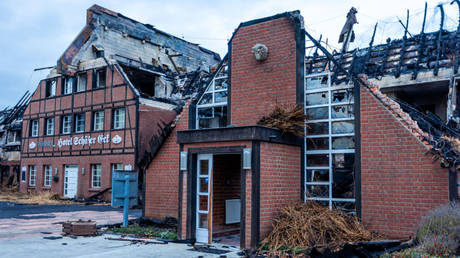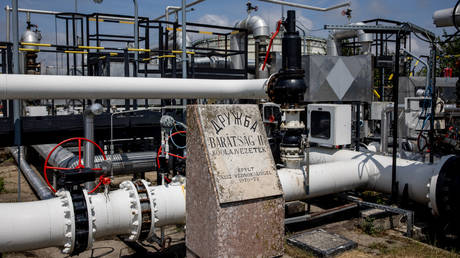
A swastika on a Red Cross sign outside the building was drawn “by unknown perpetrators” prior to the incident
The German authorities have arrested a firefighter on suspicion of setting fire to a shelter for Ukrainian refugees in northeastern Germany last month. In a statement published earlier this week, prosecutors said that a swastika which had been drawn at the entrance to the building – and prompted speculation over a potential political motive behind the arson – is not linked to the incident.
According to the Public Prosecutor’s Office in Schwerin, a 32-year-old man was arrested “on suspicion of serious arson in one case and arson in three other cases.” The suspect has denied the allegations.
A former hotel in Gross Stromkendorf was burned down on the night of October 19. Fourteen refugees and three German Red Cross staff members managed to escape unharmed. The investigation revealed that the thatched building was deliberately set on fire. The suspect was involved in extinguishing the fire later, the prosecutors said.
A swastika on a Red Cross sign outside the building was drawn “by unknown perpetrators” prior to the incident and is not related to it, according to the statement. The prosecutor’s office concluded that there is no evidence of “a politically motivated crime.”
The investigators believe that the fire was “part of a series of 19 fires in the Neuburg-Steinhausen district,” which included fires set in a carport and a heap of straw. In October, an empty house in Blowatz was also burned down.
The prosecutors’ conclusions prompted a backlash in political circles.
“Even if the investigations are still ongoing, it is certain that the fire was set in such a way that immigrants were deliberately put at risk. That turns arson into an attack!” Ole Kruger, the Greens Mecklenburg-Western Pomerania state chairman, tweeted.
Local MP Michael Noetzel said it is too early to rule out a political motive for the crime, as all of the previous fires targeted uninhabited buildings.
Since the beginning of the Russian military operation in Ukraine in late February, Germany has welcomed over a million of Ukrainian refugees, according to the office of the UN High Commissioner for Refugees.
“The largest refugee influx since WWII,” as the government described it, has led to some municipalities becoming overwhelmed by the numbers of Ukrainian migrants.
In September, the leader of the Christian Democratic Union (CDU), Friedrich Merz, accused the authorities of encouraging what he called “social tourism” on the part of Ukrainians. The “refugees” have been traveling back and forth between Germany and Ukraine, which they had supposedly fled, he claimed. The remarks were condemned by his political opponents, who later claimed that the fire in Gross Stromkendorf is an example of the type of violence this sort of rhetoric can trigger.




